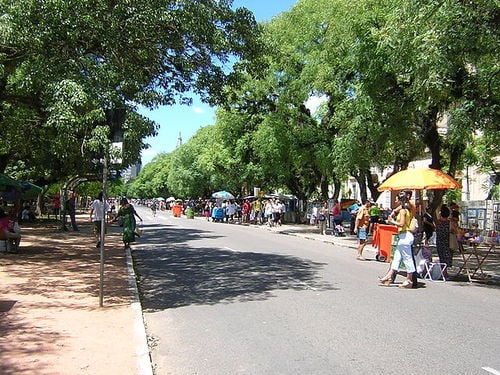(creating page) |
m (ext links) |
||
| (6 intermediate revisions by the same user not shown) | |||
| Line 2: | Line 2: | ||
== Initiatives by topic == | == Initiatives by topic == | ||
=== Community involvement === | |||
==== Public platform giving citizens decision-making power over their water utilities ==== | |||
In order to meet the rising demands of Porto Alegre's rapidly growing population during the early 1900s, the municipal government took over inefficient private water companies. The financially independent, publicly owned, autonomously operating, "Departamento Municipal de Água e Esgoto" (Municipal Water and Sewerage department, or DMAE in Portuguese) successfully developed necessary water treatments, and improved and extended the network. | |||
Reforms following [[Brazil]]'s military dictatorship (1964–1985) included citizen decision-making power over their water utilities and participatory governance mechanisms, such as the Deliberative Council and the Participatory Budgeting. These have significantly contributed towards the modern success of the DMAE. | |||
The Deliberative Council (DC) is one of the DMAE's three functional management bodies. Formed by a heterogeneous group of experts and delegates from citizens' organisations, the DC is a non-party institution that controls and approves all operations and decisions taken by the DMAE. How the budget is spent is also decided by the people: the annual Participatory Budgeting process, whose internal rules are established by participating citizens themselves, lets them choose the priority level of upcoming city projects through neighbourhood assemblies, "thematic" assemblies, and citywide coordinating sessions. | |||
The DMAE has become the largest and one of the most efficient municipal providers of sanitation services in Brazil. Treated water reaches 100 percent of Porto Alegre's population, and sewer collection services cover 87.7 percent. Participatory budgeting has significantly improved situations in peripheral areas, with around 50,000 residents taking part on this process. <ref>[https://www.shareable.net/blog/public-platform-for-citizen-led-water-management Shareable], Nikolas Kichler, Feb 12, 2019</ref> | |||
*[http://www2.portoalegre.rs.gov.br/dmae/ DMAE] (Portuguese) | |||
==== Other links ==== | |||
Participatory budgeting in Porto Alegre {{W|Participatory budgeting in Porto Alegre}} | |||
The Citizens of Porto Alegre, In which Marco borrows bus fare and enters politics, Gianpaolo Baiocchi, <ref>[http://bostonreview.net/BR31.2/baiocchi.php Boston Review]</ref> March / April 2006 | The Citizens of Porto Alegre, In which Marco borrows bus fare and enters politics, Gianpaolo Baiocchi, <ref>[http://bostonreview.net/BR31.2/baiocchi.php Boston Review]</ref> March / April 2006 | ||
=== Trees, woodland and forest === | |||
The [http://goncalodecarvalho.blogspot.com/p/os-amigos-da-rua-das-arvores.html Amigos da Rua Gonçalo de Carvalho]'s blog (Friends of Gonçalo Carvalho Street) [pt] explains how a group of people in Porto Alegre, Brazil, mobilized an advocacy campaign against the plan for a new development construction in that street. Gonçalo de Carvalho Street is nowadays considered historical, cultural, ecological and environmental heritage. <ref>[http://globalvoicesonline.org/2011/04/22/brazil-friends-and-advocates-of-a-street-full-of-trees/ globalvoicesonline.org]</ref> Sara Moreira, 22 April 2011 | The [http://goncalodecarvalho.blogspot.com/p/os-amigos-da-rua-das-arvores.html Amigos da Rua Gonçalo de Carvalho]'s blog (Friends of Gonçalo Carvalho Street) [pt] explains how a group of people in Porto Alegre, Brazil, mobilized an advocacy campaign against the plan for a new development construction in that street. Gonçalo de Carvalho Street is nowadays considered historical, cultural, ecological and environmental heritage. <ref>[http://globalvoicesonline.org/2011/04/22/brazil-friends-and-advocates-of-a-street-full-of-trees/ globalvoicesonline.org]</ref> Sara Moreira, 22 April 2011 | ||
== Interwiki links == | == Interwiki links == | ||
Porto Alegre {{W|Porto Alegre}} | |||
{{ | {{scaendmenu}}{{stub}} | ||
[[category: | [[category:CASwiki stubs]] | ||
[[category:Cities in Brazil]] | [[category:Cities in Brazil]] | ||
'''References''' | '''References''' | ||
{{Attrib sca ref|Porto Alegre}} | |||
<references/> | <references/> | ||
Revision as of 17:47, 13 February 2019

Initiatives by topic
Community involvement
Public platform giving citizens decision-making power over their water utilities
In order to meet the rising demands of Porto Alegre's rapidly growing population during the early 1900s, the municipal government took over inefficient private water companies. The financially independent, publicly owned, autonomously operating, "Departamento Municipal de Água e Esgoto" (Municipal Water and Sewerage department, or DMAE in Portuguese) successfully developed necessary water treatments, and improved and extended the network.
Reforms following Brazil's military dictatorship (1964–1985) included citizen decision-making power over their water utilities and participatory governance mechanisms, such as the Deliberative Council and the Participatory Budgeting. These have significantly contributed towards the modern success of the DMAE.
The Deliberative Council (DC) is one of the DMAE's three functional management bodies. Formed by a heterogeneous group of experts and delegates from citizens' organisations, the DC is a non-party institution that controls and approves all operations and decisions taken by the DMAE. How the budget is spent is also decided by the people: the annual Participatory Budgeting process, whose internal rules are established by participating citizens themselves, lets them choose the priority level of upcoming city projects through neighbourhood assemblies, "thematic" assemblies, and citywide coordinating sessions.
The DMAE has become the largest and one of the most efficient municipal providers of sanitation services in Brazil. Treated water reaches 100 percent of Porto Alegre's population, and sewer collection services cover 87.7 percent. Participatory budgeting has significantly improved situations in peripheral areas, with around 50,000 residents taking part on this process. [1]
- DMAE (Portuguese)
Other links
Participatory budgeting in Porto Alegre W
The Citizens of Porto Alegre, In which Marco borrows bus fare and enters politics, Gianpaolo Baiocchi, [2] March / April 2006
Trees, woodland and forest
The Amigos da Rua Gonçalo de Carvalho's blog (Friends of Gonçalo Carvalho Street) [pt] explains how a group of people in Porto Alegre, Brazil, mobilized an advocacy campaign against the plan for a new development construction in that street. Gonçalo de Carvalho Street is nowadays considered historical, cultural, ecological and environmental heritage. [3] Sara Moreira, 22 April 2011
Interwiki links
Porto Alegre W
References Template:Attrib sca ref
- ↑ Shareable, Nikolas Kichler, Feb 12, 2019
- ↑ Boston Review
- ↑ globalvoicesonline.org